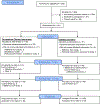Improving Glycemic Control in African Americans With Diabetes and Mild Cognitive Impairment
- PMID: 32043561
- PMCID: PMC8311466
- DOI: 10.1111/jgs.16339
Improving Glycemic Control in African Americans With Diabetes and Mild Cognitive Impairment
Abstract
Background/objectives: Improving glycemic control in older African Americans with diabetes and mild cognitive impairment (MCI) is important as the population ages and becomes more racially diverse.
Design: Randomized controlled trial.
Setting: Recruitment from primary care practices of an urban academic medical center. Community-based treatment delivery.
Participants: Older African Americans with MCI, low medication adherence, and poor glycemic control (N = 101).
Interventions: Occupational therapy (OT) behavioral intervention and diabetes self-management education.
Measurements: The primary outcome was a reduction in hemoglobin A1c level of at least 0.5% at 6 months, with maintenance effects assessed at 12 months.
Results: At 6 months, 25 of 41 (61.0%) OT participants and 22 of 46 (48.2%) diabetes self-management education participants had a reduction in hemoglobin A1c level of at least 0.5%. The model-estimated rates were 58% (95% confidence interval [CI] = 45%-75%) and 48% (95% CI = 36%-64%), respectively (relative risk [RR] = 1.21; 95% CI = 0.84-1.75; P = .31). At 12 months, the respective rates were 21 of 39 (53.8%) OT participants and 24 of 49 (49.0%) diabetes self-management education participants. The model-estimated rates were 50% (95% CI = 37%-68%) and 48% (95% CI = 36%-64%), respectively (RR = 1.05; 95% CI = 0.70-1.57; P = .81).
Conclusion: Both interventions improved glycemic control in older African Americans with MCI and poor glycemic control. This result reinforces the American Diabetes Association's recommendation to assess cognition in older persons with diabetes and demonstrates the potential to improve glycemic control in this high-risk population. J Am Geriatr Soc 68:1015-1022, 2020.
Trial registration: ClinicalTrials.gov NCT02174562.
Keywords: African Americans; adult-onset diabetes; cognition; hemoglobin A1c; medication adherence.
© 2020 The American Geriatrics Society.
Conflict of interest statement
Figures
References
-
- National Institute of Diabetes and Digestive and Kidney Diseases. Diabetes in African Americans. Bethesda, MD: U.S. Department of Health and Human Services, National Institutes of Health; 2005. NIH Publication No. 02–3266.
-
- Centers for Disease Control and Prevention. CDC Health Disparities and Inequalities Report—United States, 2013. http://www.cdc.gov/minorityhealth/CHDIReport.html. Accessed January 16, 2020.
Publication types
MeSH terms
Substances
Associated data
Grants and funding
LinkOut - more resources
Full Text Sources
Medical



